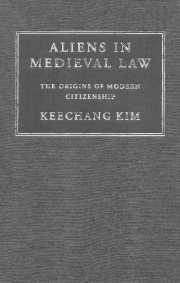7 - Thomas Littleton, John Rastell and Edmund Plowden
Published online by Cambridge University Press: 08 July 2009
Summary
For a long time in Europe, inequality was the moral and legal ideal. The fundamental division in the law of personal status was between the free and the unfree. All other divisions were subordinate to this summa divisio. In the preceding chapters, we have examined an important change which was introduced in England in the fourteenth century. First came the remarkable shift of outlook: faith and allegiance should guarantee the enjoyment of legal beneift within the realm (1351). Then came, as a corollary, the idea that a lack of faith and allegiance should disqualify a person from the enjoyment of legal benefit and advantage within the realm. A new approach to the law of personal status was being introduced. The new summa divisio personarum was to be drawn between those who were within (having faith and allegiance to the king) and those who were without. All other categorical divisions among persons would be given secondary importance. It was, in my view, a revolutionary change in the law of personal status in Europe.
However, a change of legal outlook does not automatically introduce new legal terms and definitions. Change of law entails change of resource distribution patterns. To reduce the resistance of adversely affected groups, it is preferable that the change should be introduced with minimum visibility. The inherent ambiguity of language will provide the key to a discreet, but successful legal change.
- Type
- Chapter
- Information
- Aliens in Medieval LawThe Origins of Modern Citizenship, pp. 147 - 175Publisher: Cambridge University PressPrint publication year: 2000



